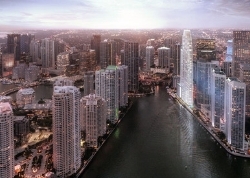In the past, Miami's developments were strictly targeted to buyers. Developers were building with the only purpose of selling as many units as possible, but we have seen in the past few years the beginning of a new trend. Miami is becoming more and more a city of renters and even more short term renters. This has pushed high-end units to change their strategy.
In a seasonal city as Miami, units are more attractive if they allow rentals, the shorter the better. For instance, new developments as the Panorama Tower on Brickell , unlikely its older peers, is now seeking to target leasing deals.
Over half of the units have already been rented, even if newer developers are trying to get into the same field, which has raised the supply. It has simply shown to be the best path to follow in today's market.
It is true that it's an ideal bet right now, but eventually, the increasing supply will push rent prices down. The renter's pool is getting more and more crowded and there will be a peak when new pools would need to be created. New and cheaper pools. This is the only way the market will find a balance.
Since 2014, leases in condos, have increased 96% and rent prices up to 45%. But why? rentals, nowadays, are the dream of anyone moving into Miami. However, this is not news, every year, 1/5 of the condo units delivered are put on the renter's condo market. But what is the problem then? Mainly the competitors.
The conventional apartment buildings are the direct competition of condo owners. Even if the lease prices are higher for condos, the costs of maintaining it, don't balance the profit. Condo owners have to pay for association fees, property taxes, and special assessment, getting profits tighter every time. Also, since the Federal Reserve made commercial lending more flexible, building a conventional apartment tower is less expensive than a condo. This obviously increases margins. Condos on the other side, have been developed under a lender's debt.
Moreover, conventional apartment building are financed by investors, like equity firms who are only investing in the long-term and don't seem to be affected by the short-term market fluctuations caused by a high supply. This is not the case for individual condo owners.
But as I said before, the shorter the better in Miami, and condo developers are now trying to find new ideas to compete against conventional apartments. There are people working on-site that will make sure to fix your A.C. if needed or a leak in your bathroom in minutes. Otherwise, you would have to wait for your landlord to call someone, which usually takes weeks or even months.
Short-term rentals are another strategy for developers to have an advantage over conventional apartments. New developers are making sure to be Airbnb-approved so buyers could find really appealing to invest in a place without rental restrictions.
If you want to know more new preconstruction condos that allow short-term rentals, have can take a look at Yotel Pad condo or the Smart-Brickell condo.
10 Marketing ideas
How to compete in the rental market?

Related Articles

Related Articles

Invest In Rental Properties
Owning rental property is to make the largest profit from the cheapest investment'
Related Articles

Never-ending battle between Airbnb and Miami Beach
Miami is one of the top-5 Airbnb destinations in the United States. It sounds like a great deal for everyone... Hosts get a profitable output of their investment and their guests get a more private and wide list of options where to stay. However, this is not the same point of view for the City Commission of Miami-Dade County, which has been enacting fines of $5,000 up to $20,000 when renting on this kind of platforms. Even though it has been a problem all around the city, Miami Beach has suffered the most.
Related Articles
Welcome to the Yacht Club at Portofino!
Discover the Yacht Club at Portofino and its amenities!
